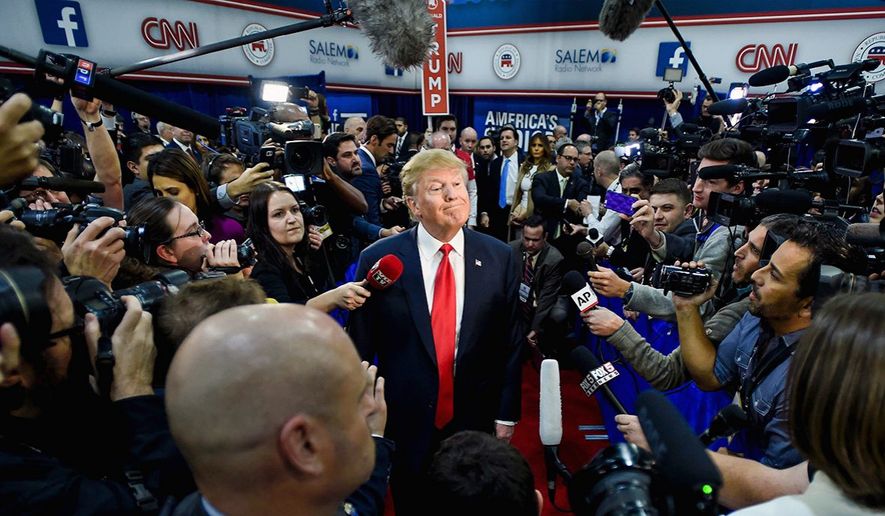President-elect Donald Trump never hid his contempt for the news media during the campaign and has continued to keep the press at bay after winning the election, raising concerns he will end the tradition of allowing a pool of reporters to cover his every move in public.
Mr. Trump, who at campaign rallies regularly denounced the news media as “the most dishonest people you’ll ever meet,” has support for breaking the tradition and keeping the public in the dark about his daily whereabouts.
“I don’t think Trump needs the press pool,” said Rep. Duncan Hunter, a California Republican who is a top Trump ally on Capitol Hill. “He didn’t need it when he ran and he doesn’t need it as president of the United States.”
Mr. Hunter said the news media brought it upon themselves.
“If I had just won the election after everyone said I’d lose and rooted for my opponent, why would I give anyone the time of day,” said Mr. Hunter.
Mr. Trump has not held a press conference during the campaign since July.
He relied on TV coverage of his rallies and on his Twitter following to get his message out during the campaign. When he does use traditional news media, it was with call-ins to radio or TV shows and exclusive interviews with select news outlets.
Continuing in that manner, Mr. Trump agreed to an exclusive post-election interview Friday with “60 Minutes” that will air Sunday on CBS.
Mr. Trump’s communications team did not respond to questions about the president-elect’s plans to facilitate press coverage or when he would hold a press conference.
After the 2008 election, Barack Obama as the president-elect held his first press conference by Friday. A press pool also accompanied Mr. Obama’s every move beginning the day after the election.
Although Mr. Obama largely laid low during the two days following the election, reporters accompanied him to a gym near his Chicago and to an office building where he participated in transition team meetings on the Thursday after the election.
When Mr. Obama left the office building in the late afternoon, a reporter asked how the meetings went and the president-elect responded, “good,” the Los Angeles Times reported at the time.
Reporters did not know where Mr. Trump was going Thursday after he visited the White House. The transition team eventually informed the press pool that Mr. Trump was heading back to New York, but gave no other information.
At the White House, Mr. Trump made brief remarks after meeting with Mr. Obama. They didn’t take questions, and Mr. Obama joked about it.
“We are not going to be taking any questions. Thank you,” the president told reporters as they were ushered out of the room as they began shouting out questions.
Turning to Mr. Trump, he smiled and said, “This is a good rule: Don’t answer any questions when they just start [shouting].”
The White House Correspondents’ Association President Jeff Mason said in a statement that he was “deeply concerned” by Mr. Trump’s decision to reject the practice of traveling with a protective pool of reporters for his first visit to Washington since the election.
“In addition to breaking with decades of historical precedent and First Amendment principles, this decision could leave Americans blind about his whereabouts and well-being in the event of a national crisis,” he said. “A pool of reporters is in place and ready to cover President-elect Trump. The WHCA urges President-elect Trump to allow it to do its job, including being present for motorcade movements, meetings, and other interactions. Not allowing a pool of journalists to travel with and cover the next president of the United States is unacceptable.”
Mr. Trump also arrived at the White House in a black SUV through the southeast gate, allowing him to enter the executive mansion from the South Lawn, away from TV cameramen and photographers. Normally, VIPs arrive on the West Wing side of the White House, where photographers with telephoto lenses can record their entry into the building.
Rep. Lou Barletta, another Trump confident on Capitol Hill, said the news media doesn’t deserve access to the president-elect — and most Americans don’t trust what they report anyway.
“Much of the mainstream media has some soul searching to do before they are criticizing him for not letting them tag along,” said the Pennsylvania Republican. “It’s been obvious that they haven’t been fair to Donald Trump. They haven’t reported the news fairly during the campaign.”
He said the news media’s access to Mr. Trump had nothing to do with informing the American public.
“The American people didn’t know what was going on during the campaign because [news outlets] were not reporting the news accurately. If you ask most Americans right now they don’t trust the media and what they are reporting,” said Mr. Barletta. “Hopefully that relationship will get better.”
However, shunning the news media as president carries substantial risks, said Michael Corgan, a political science professor at Boston University’s Pardee School.
“Donald Trump is in for a surprise because he’s going to be in the spotlight all the time like he never has been before,” said Mr. Corgan, an expert on the U.S. presidency.
Shutting out the press not only risks alienating the public, he said, but also creates a news vacuum that political opponents or competitors will fill.
“Everyone in Washington wants power and Congress doens’t want to be seen as a Russian Duma. Those people are going to fill the vacuum and then he’s going to have problems getting anything through,” said the professor. “Trump is gong to have to learn to deal with the press or else he’s going to cede power for much of the agenda setting to the Congress, even if it’s his own party.”
• Dave Boyer contributed to this report.
• S.A. Miller can be reached at smiller@washingtontimes.com.




Please read our comment policy before commenting.